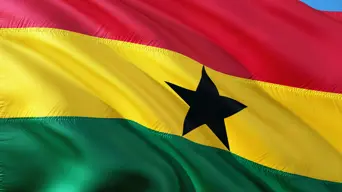Five things to know about Ghana
Here are five things to know about the nation of some 34 million people.

Picture: jorono/Pixabay
PARIS - One of the more stable countries in the turbulent West African region, Ghana has hit hard times recently with a severe financial crisis and political infighting ahead of a presidential election on Saturday.
Here are five things to know about the nation of some 34 million people:
TOP GOLD PRODUCER
Once called the Gold Coast, Ghana has dethroned South Africa to become the continent's leading producer of the precious metal.
It is also the world's second-biggest producer of cocoa after Ivory Coast and has extracted oil since 2010.
But facing galloping inflation and widespread youth unemployment, the country is grappling with its worst economic crisis in years.
Ghana has been forced to default on its external debt due to a 2022 financial crisis.
It is gradually steadying its economy with a relief package worth $3 billion from the International Monetary Fund.
The crisis has had a direct impact on the gold industry, with a number of farmers selling their land to illegal miners.
Illegal mining, known locally as "galamsey", poses a serious risk to the environment by polluting soil and water -- threatening cacao production in particular -- and the issue has been a feature in the campaign.
TURNING PAGE ON THE SLAVE TRADE
After more than 80 years as a British colony, Ghana was the first country in sub-Saharan Africa to gain independence, on March 6, 1957.
Previously, between the 15th and 18th centuries, Ghana was a key departure point for the slave trade to Europe, America and the Caribbean.
Cape Coast, southwest of the capital Accra, was once the largest slave-trading centre in West Africa from where slaves were shipped to North and South America and the Caribbean.
Now a fishing village, it has become a major tourist attraction.
In 2019, Ghana's President Nana Akufo-Addo launched a programme encouraging African Americans to reconnect with their roots.
After this "Year of Return", a number of African Americans have settled permanently in Ghana.
STABILITY, WITH FAULT LINES
Ghana is often considered a model of political stability in a region shaken by coups and insecurity.
But its parliament has shown recent signs of unrest.
In 2021 during the inauguration of parliament, soldiers intervened to restore order after an outright brawl between members of the ruling New Patriotic Party and the main opposition, the National Democratic Congress.
The presidential vote on Saturday takes place alongside legislative elections, and a fierce battle is expected between the two main parties.
FAST FASHION TSUNAMI
Ghana is one of the world's largest importers of secondhand clothing and it has created mountains of textile waste.
In 2022, $164 million worth of used clothing was shipped to the country, mainly from Britain, China and Canada, according to the Observatory of Economic Complexity.
But the rise of fast fashion over the last two decades has been something of a poisoned chalice.
While the business has created jobs, it has also caused what NGOs say is an environmental and social crisis.
Ghanaian traders are also seeing their prices drop as the low-quality clothing floods the market.
PIONEER PHOTOJOURNALIST
James Barnor, the country's first and most renowned photojournalist, captured for more than half a century the changing face of Ghana.
His street scenes from Accra to London, teeming with life and colourful characters, are exhibited worldwide.
"I always liked to show pleasure, life and futureness in people," Barnor said in a BBC Africa documentary made this year to mark his 95th birthday.